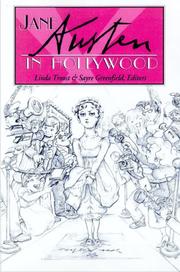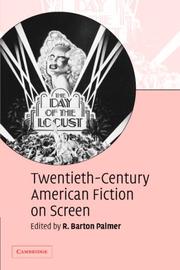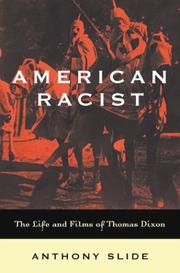| Listing 1 - 10 of 15 | << page >> |
Sort by
|
Book
Year: 2004 Publisher: Johns Hopkins University Press
Abstract | Keywords | Export | Availability | Bookmark
 Loading...
Loading...Choose an application
- Reference Manager
- EndNote
- RefWorks (Direct export to RefWorks)
William Faulkner occupied a unique position as a modern writer. Although famous for his modernist novels and their notorious difficulty, he also wrote extensively for the "culture industry," and the works he produced for it—including short stories, adaptations, and screenplays—bore many of the hallmarks of consumer art. His experiences as a Hollywood screenwriter influenced him in a number of ways, many of them negative, while the films turned out by the "dream factories" in which he labored sporadically inspired both his interest and his contempt. Faulkner also disparaged the popular magazines—though he frequently sold short stories to them.To what extent was Faulkner's deeply ambivalent relationship to—and involvement with—American popular culture reflected in his modernist or "art" fiction? Peter Lurie finds convincing evidence that Faulkner was keenly aware of commercial culture and adapted its formulae, strategies, and in particular, its visual techniques into the language of his novels of the 1930s. Lurie contends that Faulkner's modernism can be best understood in light of his reaction to the popular culture of his day. Using Theodor Adorno's theory about modern cultural production as a framework, Lurie's close readings of Sanctuary, Light in August, Absalom! Absalom!, and If I Forget Thee, Jerusalem uncover the cultural history that surrounded and influenced the development of Faulkner's art. Lurie is particularly interested in the influence of cinema on Faulkner's fiction and especially the visual strategies he both deployed and critiqued. These include the suggestion of cinematic viewing on the part of readers and of characters in each of the novels; the collective and individual acts of voyeurism in Sanctuary and Light in August; the exposing in Absalom! Absalom! and Light in Augustof stereotypical and cinematic patterns of thought about history and race; and the evocation of popular forms like melodrama and the movie screen in If I Forget Thee, Jerusalem. Offering innovative readings of these canonical works, this study sheds new light on Faulkner's uniquely American modernism.
Film adaptations. --- American fiction --- Motion pictures --- Popular culture --- History --- Faulkner, William, --- Film and video adaptations. --- Literary theory
Book
ISBN: 9780521895750 9780511781834 9780511787874 0511787871 9780511786730 0511786735 9780511789335 0511789335 0511781830 0521895758 1816046000 9781816046000 0511848528 9780511848520 1107212065 9781107212060 1282723537 9781282723535 9786612723537 661272353X 0511788606 9780511788604 0511785593 9780511785597 Year: 2010 Volume: *11 Publisher: Cambridge : Cambridge University Press,
Abstract | Keywords | Export | Availability | Bookmark
 Loading...
Loading...Choose an application
- Reference Manager
- EndNote
- RefWorks (Direct export to RefWorks)
Opera can reveal something fundamental about a film, and film can do the same for an opera, argues Marcia J. Citron. Structured by the categories of Style, Subjectivity, and Desire, this volume advances our understanding of the aesthetics of the opera/film encounter. Case studies of a diverse array of important repertoire including mainstream film, opera-film, and postmodernist pastiche are presented. Citron uses Werner Wolf's theory of intermediality to probe the roles of opera and film when they combine. The book also refines and expands film-music functions, and details the impact of an opera's musical style on the meaning of a film. Drawing on cinematic traditions of Hollywood, France, and Britain, the study explores Coppola's Godfather trilogy, Jewison's Moonstruck, Nichols's Closer, Chabrol's La Cérémonie, Schlesinger's Sunday, Bloody Sunday, Boyd's Aria, and Ponnelle's opera-films.
Motion pictures and opera. --- Musical films --- Opera in motion pictures. --- History and criticism. --- Operas --- Film and video adaptations --- Motion pictures --- Opera and motion pictures --- Opera

ISBN: 9042022841 9789042022843 9401205019 1282265865 1435611845 9781435611849 9789401205016 9781282265868 Year: 2007 Volume: 63 Publisher: Amsterdam New York Rodopi
Abstract | Keywords | Export | Availability | Bookmark
 Loading...
Loading...Choose an application
- Reference Manager
- EndNote
- RefWorks (Direct export to RefWorks)
The essays collected in this book focus on the multi-faceted relationship between German/Austrian literature and the cinema screen. Scholars from Ireland, Great Britain, Germany, Switzerland, Luxembourg, Portugal, USA and Canada present critical readings of a wide range of transpositions of German-language texts to film, while also considering the impact of cinema on German literature, exploring intertextualities as well as intermedialities. The forum of discussion thus created encompasses cinematic narratives based on Goethe’s Faust , Kleist’s Marquise of O ..., Kubrick’s film version of Schnitzler’s Dream Story and Caroline Link’s Oscar-winning adaptation of Stefanie Zweig’s novel Nowhere in Africa . The wide-ranging analyses of the complex interaction between literature and film presented here focus on literary works by Anna Seghers, Hans-Magnus Enzensberger, Nicola Rhon, Günter Grass, Heinrich Böll, Elfriede Jelinek, Rolf Dieter Brinkmann, Erich Hackl, Thomas Brussig, Sven Regener, Frank Goosen and Robert Schneider, as well as on adaptations by filmmakers such as Friedrich Wilhelm Murnau, Max Mack, Josef von Sternberg, Max W. Kimmich, Fred Zinnemann, Paul Wegener, Alexander Kluge, Volker Schlöndorff, Hansjürgen Pohland, Hendrik Handloegten, Michael Haneke, Christoph Stark, Karin Brandauer, Joseph Vilsmaier, Leander Haußmann and Doris Dörrie.
German literature -- Film adaptations. --- Intertextuality. --- Motion pictures -- Germany. --- German literature --- Motion pictures --- Intertextuality --- Music, Dance, Drama & Film --- Film --- Film and video adaptations. --- Criticism --- Semiotics --- Influence (Literary, artistic, etc.)

ISBN: 9780521842211 9780511607554 9780521603164 9780511275135 0511275137 0511273622 9780511273629 0511274432 9780511274435 9780511271199 0511271190 9780511270819 051127081X 0511607555 128081537X 9781280815379 9786610815371 6610815372 0521842212 0521603161 0521603161 0521842212 1107163293 9781107163294 0511272839 9780511272837 0511320906 9780511320903 Year: 2007 Publisher: Cambridge : Cambridge University Press,
Abstract | Keywords | Export | Availability | Bookmark
 Loading...
Loading...Choose an application
- Reference Manager
- EndNote
- RefWorks (Direct export to RefWorks)
The process of translating works of literature to the silver screen is a rich field of study for both students and scholars of literature and cinema. The fourteen essays collected in this 2007 volume provide a survey of the important films based on, or inspired by, nineteenth-century American fiction, from James Fenimore Cooper's The Last of the Mohicans to Owen Wister's The Virginian. Many of the major works of the American canon are included, including The Scarlet Letter, Moby Dick and Sister Carrie. The starting point of each essay is the literary text itself, moving on to describe specific aspects of the adaptation process, including details of production and reception. Written in a lively and accessible style, the book includes production stills and full filmographies. Together with its companion volume on twentieth-century fiction, the volume offers a comprehensive account of the rich tradition of American literature on screen.
Film adaptations --- History and criticism --- American fiction --- 19th century --- Film and video adaptations --- American literature --- History and criticism. --- Film adaptations. --- Arts and Humanities --- Literature

ISBN: 0813137764 1283327562 9786613327567 0813171210 9780813171210 9780813137766 0813190061 9780813120843 9781283327565 6613327565 9780813190068 Year: 2001 Publisher: Lexington University Press of Kentucky
Abstract | Keywords | Export | Availability | Bookmark
 Loading...
Loading...Choose an application
- Reference Manager
- EndNote
- RefWorks (Direct export to RefWorks)
"An excellent example of literary criticism, as each of the fourteen essays is well-researched and scholarly but with a touch of humor."--Film & History. "Few scholarly works excite sufficient demand to require a second edition within three yours of the first publication, but this collection of essays on Austen and Hollywood has attracted an audience far beyond academe."--Eighteenth Century Current Bibliography. "It is good to know that serious study of Austen's stature as a cultural icon for different reading publics is beginning."--Times Literary Supplement. "Such a book was sure to follow the Austen explosion and we welcome it."--Literature/Film Quarterly. "This book has something for both the Austen scholar and the Austen enthusiast."--Booklist. "[These articles] are engaging and sure to spark discussion"--Library Journal. In 1995 and 1996 six film or television adaptations of Jane Austen's novels were produced -- an unprecedented number. More amazing, all were critical and/or box office successes. What accounts for this explosion of interest? Much of the appeal of these films lies in our nostalgic desire at the end of the millennium for an age of greater politeness and sexual reticence. Austen's ridicule of deceit and pretentiousness also appeals to our fin de siecle sensibilities. The novels were changed, however, to enhance their appeal to a wide popular audience, and the revisions reveal much about our own culture and its values. These recent productions espouse explicitly twentieth-century feminist notions and reshape the Austenian hero to make him conform to modern expectations. Linda Troost and Sayre Greenfield present fourteen essays examining the phenomenon of Jane Austen as cultural icon, providing thoughtful and sympathetic insights on the films through a variety of critical approaches. The contributors debate whether these productions enhance or undercut the subtle feminism that Austen promoted in her novels. From Persuasion to Pride and Prejudice, from the three Emmas (including Clueless) to Sense and Sensibility, these films succeed because they flatter our intelligence and education. And they have as much to tell us about ourselves as they do about the world of Jane Austen. This second edition includes a new chapter on the recent film version of Mansfield Park.
Women in motion pictures. --- Film adaptations --- English fiction --- Motion pictures --- History and criticism. --- Austen, Jane, --- Ao-ssu-ting, --- Ao-ssu-ting, Chien, --- Aosiding, --- Aosiding, Jian, --- Āsṭin̲, Jēn̲, --- Austenová, Jane, --- Osten, Dzheĭn, --- Ostin, Dzhein, --- Lady, --- Author of Sense and Sensibility, --- Остен, Джейн, --- Остен, Джейм, --- אוסטן, ג׳יין --- אוסטן, ג׳יין, --- أوستن، جين، --- Film and video adaptations. --- England --- Angleterre --- Anglii︠a︡ --- Inghilterra --- Engeland --- Inglaterra --- Anglija --- England and Wales --- In motion pictures. --- Roman anglais --- Cinéma --- Femmes au cinéma --- Adaptations cinématographiques et télévisées --- Hollywood (Los Angeles, Calif.) --- Angleterre au cinéma --- Angleterre au cinéma. --- Aufsatzsammlung. --- Engels. --- Femmes au cinéma. --- Film adaptations. --- Motion pictures. --- Roman. --- Romans. --- Verfilmingen. --- Verfilmung. --- Adaptations cinématographiques et télévisées. --- Andrae, A. --- Austen, Jane. --- England. --- Women in motion pictures --- Cinéma --- --Littérature --- --Austen, Jane, --- Film and video adaptations --- In motion pictures --- Littérature --- Austen, Jane, - 1775-1817 - Film and video adaptations --- England - In motion pictures --- Austen, Jane, - 1775-1817

ISBN: 9780521542302 0521542308 9780521834445 0521834449 9780511610950 0511274378 9780511274374 0511272758 9780511272752 0511273541 9780511273544 9780511271113 0511271115 9780511270888 0511270887 9780511275074 0511275072 0511610955 1280815310 9781280815317 9786610815319 6610815313 1107161061 9781107161061 0511321228 9780511321221 Year: 2007 Publisher: Cambridge : Cambridge University Press,
Abstract | Keywords | Export | Availability | Bookmark
 Loading...
Loading...Choose an application
- Reference Manager
- EndNote
- RefWorks (Direct export to RefWorks)
The essays in this collection analyse major film adaptations of twentieth-century American fiction, from F. Scott Fitzgerald's The Last Tycoon to Toni Morrison's Beloved. During the century, films based on American literature came to play a central role in the history of the American cinema. Combining cinematic and literary approaches, this volume explores the adaptation process from conception through production and reception. The contributors explore the ways political and historical contexts have shaped the transfer from book to screen, and the new perspectives that films bring to literary works. In particular, they examine how the twentieth-century literary modes of realism, modernism, and postmodernism have influenced the forms of modern cinema. Written in a lively and accessible style, the book includes production stills and full filmographies. Together with its companion volume on nineteenth-century fiction, the volume offers a comprehensive account of the rich tradition of American literature on screen.
American fiction --- Motion pictures and literature --- Roman américain --- Cinéma et littérature --- Film and video adaptations --- Adaptations cinématographiques et télévisées --- Film adaptations --- Film adaptations. --- History and criticism. --- Roman américain --- Cinéma et littérature --- Adaptations cinématographiques et télévisées --- American literature --- Arts and Humanities --- Literature

ISBN: 0813138248 1283232944 9786613232946 0813171911 9780813171913 9780813138244 0813123283 9780813123288 Year: 2004 Publisher: Lexington : University Press of Kentucky,
Abstract | Keywords | Export | Availability | Bookmark
 Loading...
Loading...Choose an application
- Reference Manager
- EndNote
- RefWorks (Direct export to RefWorks)
"" Thomas Dixon has a notorious reputation as the writer of the source material for D.W. Griffith's groundbreaking and controversial 1915 feature film The Birth of a Nation. Perhaps unfairly, Dixon has been branded an arch-conservative and a racist obsessed with what he viewed as ""the Negro problem."" As American Racist makes clear, however, Dixon was a complex, multi-talented individual who, as well as writing some of the most popular novels of the early twentieth century, was involved in the production of some eighteen films. Dixon used the motion picture as a propaganda tool for his
Racism in literature. --- Racism --- Racism in motion pictures. --- African Americans in literature. --- African Americans in motion pictures. --- Film adaptations --- Authors, American --- Motion pictures --- Afro-Americans in literature --- Negroes in literature --- Afro-Americans in motion pictures --- Negroes in moving-pictures --- Race films --- History and criticism. --- History --- Dixon, Thomas, --- Dixon, Thomas F., --- Political and social views. --- Film and video adaptations.

ISBN: 1134400586 1280289473 9786610289479 020301104X 0203236203 9780203011041 6610289476 9780415306676 0415306671 0415306671 9781134400539 9781134400577 9781134400584 9780415546126 1134400578 Year: 2005 Volume: 18. Publisher: London ; New York : RoutledgeCurzon,
Abstract | Keywords | Export | Availability | Bookmark
 Loading...
Loading...Choose an application
- Reference Manager
- EndNote
- RefWorks (Direct export to RefWorks)
Providing many interesting case studies and bringing together many leading authorities on the subject, this book examines the importance of film adaptations of literature in Russian cinema, especially during the Soviet period when the cinema was accorded a vital role in imposing the authority of the communist regime on the consciousness of the Soviet people.
Film adaptations. --- Russian literature --- Motion pictures and literature --- Literature and motion pictures --- Moving-pictures and literature --- Literature --- Adaptations, Film --- Books, Filmed --- Filmed books --- Films from books --- Motion picture adaptations --- Motion pictures --- Film adaptations --- Adaptations --- Adaptations cinématographiques --- Littérature russe --- Cinéma et littérature --- Film and video adaptations. --- Adaptations cinématographiques et télévisées
Book
ISBN: 1469641607 9781469641607 Year: 2000 Publisher: Chapel Hill : Baltimore, Md. : University of North Carolina At Chapel Hill, Dept. of Romance Languages, Project MUSE,
Abstract | Keywords | Export | Availability | Bookmark
 Loading...
Loading...Choose an application
- Reference Manager
- EndNote
- RefWorks (Direct export to RefWorks)
Spanish drama --- Motion pictures and theater --- Film adaptations. --- Spanish literature --- Moving-pictures and theater --- Theater and motion pictures --- Theater --- Adaptations, Film --- Books, Filmed --- Filmed books --- Films from books --- Literature --- Motion picture adaptations --- Motion pictures --- Film and video adaptations. --- Film adaptations --- Adaptations
Book
ISBN: 0292793391 0292719841 Year: 2010 Publisher: Austin : University of Texas Press,
Abstract | Keywords | Export | Availability | Bookmark
 Loading...
Loading...Choose an application
- Reference Manager
- EndNote
- RefWorks (Direct export to RefWorks)
Edna Ferber's Hollywood reveals one of the most influential artistic relationships of the twentieth century—the four-decade partnership between historical novelist Edna Ferber and the Hollywood studios. Ferber was one of America's most controversial popular historians, a writer whose uniquely feminist, multiracial view of the national past deliberately clashed with traditional narratives of white masculine power. Hollywood paid premium sums to adapt her novels, creating some of the most memorable films of the studio era—among them Show Boat, Cimarron, and Giant. Her historical fiction resonated with Hollywood's interest in prestigious historical filmmaking aimed principally, but not exclusively, at female audiences. In Edna Ferber's Hollywood, J. E. Smyth explores the research, writing, marketing, reception, and production histories of Hollywood's Ferber franchise. Smyth tracks Ferber's working relationships with Samuel Goldwyn, Leland Hayward, George Stevens, and James Dean; her landmark contract negotiations with Warner Bros.; and the controversies surrounding Giant's critique of Jim-Crow Texas. But Edna Ferber's Hollywood is also the study of the historical vision of an American outsider—a woman, a Jew, a novelist with few literary pretensions, an unashamed middlebrow who challenged the prescribed boundaries among gender, race, history, and fiction. In a masterful film and literary history, Smyth explores how Ferber's work helped shape Hollywood's attitude toward the American past.
Sex role in literature. --- Racism in literature. --- Motion pictures --- Historical fiction, American --- Women in the motion picture industry --- History --- Film and video adaptations. --- Ferber, Edna, --- Knowledge --- Motion picture industry. --- Motion picture industry --- American historical fiction --- American fiction --- פרבר, עדנה --- פרבר, עדנה,
| Listing 1 - 10 of 15 | << page >> |
Sort by
|

 Search
Search Feedback
Feedback About
About Help
Help News
News